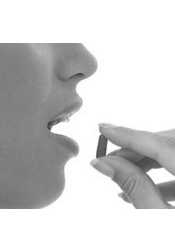AA-Theo LA tablets
This product is manufactured by AA Pharma using the ingredient theophylline.
This product is taken orally.

play
orally
Why is it prescribed?
Theophylline is used to treat symptoms of conditions such as asthma, chronic bronchitis and emphysema (e.g. shortness of breath, cough, troubled breathing).
AA-Theo LA is a sustained release tablet that releases theophylline gradually throughout the day. For this reason, it is not very useful in a situation where fast relief of bronchospasm is required.
The tablets should never be chewed or crushed but may be cut in half to help swallowing.
It may be taken with food or milk if stomach upset occurs. AA-Theo LA should always be taken at the same time in relation to meals. This medication is meant to be taken at regular intervals around the clock, and should be taken exactly as directed by your doctor. If you miss a dose of this medicine, take it as soon as possible. However, if it is almost time for your next dose, skip the missed dose and go back to your regular dosing schedule. Do not double doses. Contact your pharmacist if you are not sure what to do. Store at room temperature.
Alternatives
Other products that have the same ingredient as AA-Theo LA tablets are •Elixir de Theophylline •Theo ER •
See other products used in the treatment of •asthma •bronchitis •bronchospasm associated with COPD •chronic bronchitis (COPD) •COPD •emphysema (COPD) •sleep apnea •
Dosing is individualized. The usual adult starting dose is 200 mg to 300 mg every 12 hours. The dosage is then increased by 50-100 mg
every 12 hours at 3 day intervals until a satisfactory response is obtained or toxicity occurs. Maximum dose: 450mg every 12 hours. The use of AA-Theo LA in children under the age of twelve years is not recommended.
Theophylline is a bronchodilator that works by relaxing smooth muscles in the bronchial tubes (air passages to the lungs) to allow air to move in and out of the lungs more easily. This permits a greater volume of air to enter the lungs and reduces the effort required to breathe.
Along with its needed effects, theophylline may cause some unwanted or undesirable effects. The frequency and severity of these effects is dependant on many factors including dose, duration of therapy and individual response. Possible unwanted effects include:
- nausea
- vomiting
- diarrhea
- nervousness
- loss of appetite
- headache
- trouble in sleeping
- irritability
- tremor
- abdominal discomfort
Uncommon:
- difficult or fast breathing
- bloody or black tarry stools
- seizures
- fast or irregular heartbeat
- blood in vomit
- muscle twitching
Rare:
- rash
- flushing
- frequent urination
If you suspect that you are experiencing unwanted effects with your theophylline, check with your pharmacist.
When starting this medication, it may take a few weeks for your physician to find the dose that is right for you. The doctor may draw some blood to help him/her determine how much theophylline is in your body and then adjust your dose if there is too much or too little. The dose can vary quite significantly from person to person, even if they are the same sex, height and weight. It is very important that the correct theophylline blood level be reached as inappropriate levels may result in serious unwanted effects.
Eating or drinking large quantities of products that are high in caffeine (chocolate, tea, coffee, soft drinks) can further increase theophylline's stimulatory effects on the central nervous system (enhanced sleeplessness, agitation, uncomfortable heart beat).
Drug Interactions: Due to potentially serious interactions, it is important to inform your doctor and pharmacist of all the other medications (prescription and over-the-counter) you are taking, no matter how insignificant they may seem. Some medications can effect the amount of theophylline in the blood. The following drugs and drug classes have been known to interact with theophylline:
- beta-blockers (e.g. propranolol)
- cimetidine (e.g.Tagamet®)
- ciprofloxacin (Cipro®)
- erythromycin (e.g. Erythromid®)
- lithium (e.g. Carbolith®)
The use of tobacco may reduce the effectiveness of theophylline.
Use is not recommended in the following situations:
- allergy to any xanthine (e.g. aminophylline)
- confirmed or suspected peptic ulcer disease
Caution is recommended in the following situations:
- liver problems
- impaired kidney function
- people over 60 years of age
- heart disease
- arrhythmias (irregular heart beat)
- coronary artery disease
- congestive heart failure
- newborn or premature infants
- high blood pressure
- pneumonia
- fever
Use in pregnancy: Theophylline can be used in pregnancy. Consult your doctor or pharmacist if you suspect that you may be pregnant.
Use while breastfeeding: Theophylline can be used if breastfeeding. Consult your doctor or pharmacist before you begin breastfeeding.
Switching between brands: Products manufactured by different companies do not always deliver the same amount of theophylline, therefore the physician may have to readjust your dose after switching brands.
